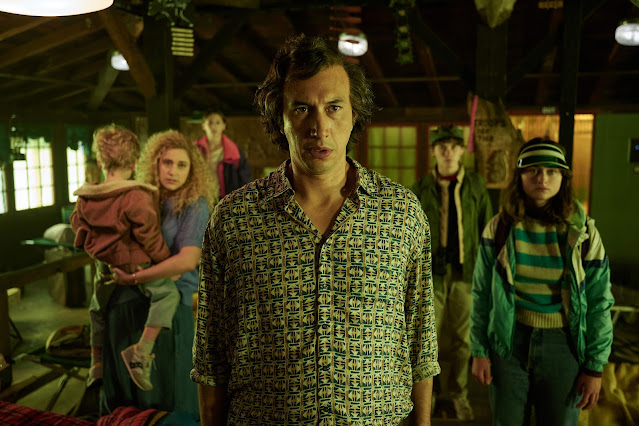I love it when novels are considered “unfilmable.” That term alone carries a certain challenge, daring filmmakers to accept the creative provocation and to put their own interpretation out into the world. The unadapted Vonneguts and Tolkiens are still begging to be brought to the screen, but there’s an endless amount of prose out there, and only a comparatively small percentage of dedicated filmmakers who are willing to put in the work to bring an infamous novel to the silver screen.
 |
| Image courtesy of Netflix |
In an anomaly for his typical family-focused fare, writer/director Noah Baumbach (Frances Ha, Marriage Story) has taken up the torch in adapting Don DeLillo’s existential novel White Noise, first published in 1985, which has since made its way onto many a high school reading list and confounded generations of grade school students. It’s a daring undertaking, but one that Baumbach and his 27-year career are fully capable of.
I wouldn’t want my summary of White Noise to sound too much like a midterm essay for English class, and it’s a difficult story to pinpoint regardless. Adam Driver stars as Jack Gladney, the world’s leading professor of Hitler studies; husband to Babette (played by Baumbach’s partner and fellow director, Greta Gerwig) and father to four children of various ages and maturities. Jack is obsessed with the idea of death, thoughts of it permeating his everyday life; and his fixation is exacerbated by a horrific train accident that results in a near-apocalyptic “Airborne Toxic Event,” the consequences of which have longer-term effects than Jack and his family were initially unprepared for.
 |
| Image courtesy of Netflix |
As previously mentioned, White Noise is a stark departure from Baumbach’s usual method of storytelling, going far beyond house and home for a heavily stylized, often melodramatic large-scale story. Family is still a focus, but it’s through the lens of existential dread and a sense of inevitability that’s a strong contrast to grounded dramas like The Squid and the Whale. White Noise endeavors to delve into the fantastical, while also attempting that same grounded presentation, and those are two visions that will often clash. It’s still remarkable to me that it was all spearheaded by one man — granted, Baumbach is a very capable director who clearly knows how to make a story appealing for the big screen, but with White Noise his writer/director instinct comes into direct conflict with a rigid literary idea of what a story should be. As we’ve learned time and time again, a novel can’t often be adapted successfully with little to no changes. These are two completely different mediums.I’ll be honest and admit that I haven’t read the source material, so there may be a lot I’m missing. I’m not sure what’s supposed to be commentary and what’s simply an exercise in oddity, because it’s hard to tell in this world of heightened reality that Baumbach has presented to us. It reminds me of “epic theatre,” a style of the performing arts where an audience is not meant to suspend their disbelief, but to instead look inward and re-examine their own reality. White Noise feels like epic theatre brought to life on-screen, aware of itself but lacking a guiding focus that would tie everything together — with a host of philosophical discussions attempting to create a moral center out of several tangential storylines.
 |
| Image courtesy of Netflix |
White Noise
isn’t made exclusively for people who have read (and enjoyed) the book, but there’s an off-putting absurdity to it that’s entirely unexpected from most of the folks involved. It’s a definite technical achievement, filled to the brim with beautiful shot composure, whip-smart editing and some engaging performances (especially from star Adam Driver and co-star/scene stealer Don Cheadle), but I’m left wondering what the point of it all was. Sometimes being too obvious with intention can be a pitfall, but a clearer direction would have benefited White Noise, where everything is metaphorical and narrative logic takes a backseat.White Noise releases in select theaters on November 25, before a Netflix premiere on December 30.




No comments:
Post a Comment